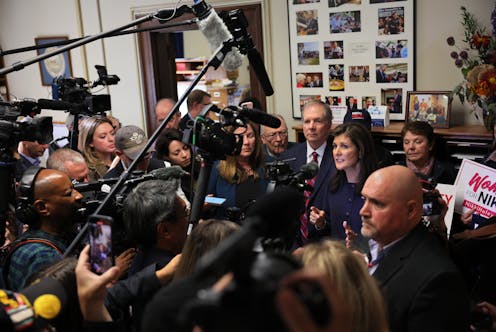Why New Hampshire and Iowa don't make sense as the opening rounds of presidential campaigns
- Written by Charles R. Hunt, Assistant Professor of Political Science, Boise State University
 Nikki Haley in a crush of reporters after filing paperwork to enter the New Hampshire primary, Oct. 13, 2023.Michael M. Santiago/Getty Images
Nikki Haley in a crush of reporters after filing paperwork to enter the New Hampshire primary, Oct. 13, 2023.Michael M. Santiago/Getty ImagesIowa and New Hampshire have long been the first states to hold presidential contests in election years.
But should they go first?
As a political scientist who studies Congress and elections, I know that this...

